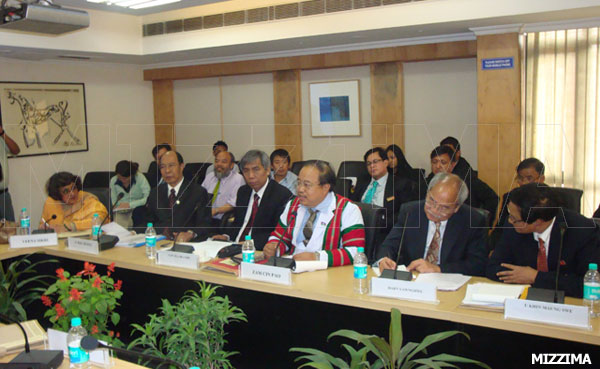Many ethnic groups have learned lessons from the past and are urging the current Burmese government to match its words with actions designed to establish a lasting peace.

Chin National Party chairman Pu Zo Zam speaks at the conference on "Myanmar: Bridging South and Southeast Asia" at Jamia Millia Islamia University in New Delhi, India. Photo: Mizzima
Officials from the Chin National Party [CNP] and the Shan Nationalities Democratic Party [SNDP] and other groups are in New Delhi to attend a conference on “Myanmar: Bridging South and Southeast Asia.”
Lower House MP Sai Thiha Kyaw of Mongyai Township (of the SNDP), talking about ethnic issues, told Mizzima that it’s important to build mutual trust to solve ethnic political problems.
“The most important thing is that they need to keep their promise. For instance, if [ethnic armed groups] tell the army to withdraw its troops in some areas, they need to withdraw. If the government army promises to withdraw and fails to keep its own promise, the other side will not trust them. We need to avoid that.”
In 1994, the former Burmese junta signed cease-fire agreements with 17 ethnic armed groups but the peace did not last, CNP chairman Zam Ciin Paul aka Pu Zo Zam told Mizzima.
“At that time, the agreements were only temporary, peace was not lasting. If we feel content with just a cease-fire, it will be the same situation again. If they want a cease-fire to be lasting, they need to understand what the ethnic armed groups want.
“They [ethnic armed groups] want equality and equity,” said Pu Zo Zam. “Only the government can systematically create a genuine union and form a federal government for stable and lasting peace to be established.”
A major obstacle to a long-lasting peace is the 2008 Constitution, according to conference members. The Constitution is lopsided and ignores ethnic groups’ concerns, they said.
“They held a National Convention for eight years. The result is the Constitution. But, we are not satisfied with it. We have no option but to accept it. There are many things to be amended in the Constitution. We desperately want the Parliament to amend the Constitution,” Pu Zo Zam said. Aung San Suu Kyi, on a recent campaign tour to Dawei, told large crowds that her party would try to correct flaws in the Constitution during the next session of Parliament.
In the past, various conferences have tried to solve ethnic problems: the Panglong Conference [1947], the Taunggyi Conference [1962] and the National Convention [1993-2008].
Pu Zo Zam said, “I’m worried about the word ‘conference.’ There were many conferences. It’ll be best if we can hold a meaningful all-inclusive convention.”
The conference was organized by Jamia Millia Islamia University, Tampadipa Institute and the Euro Burma office (EBO). A total of 30 representatives from Burma attended, including Dr. Khin Zaw Win (Tampadipa), Dr. Lyan Sar Khaung (EBO), Dr. Kyaw Thu Aung (Paungku), Thein Tun (National Union Party), Shwe ShweSein Lat (Phantiein) and Hla Hla Soe from the Karen Women’s Organization. From foreign countries, Dr Marie Lall from London University, Indian professor Baladas Ghosal and India’s Institute for Defence Studies and Analyses Director Dr. Arvind Gupta.



